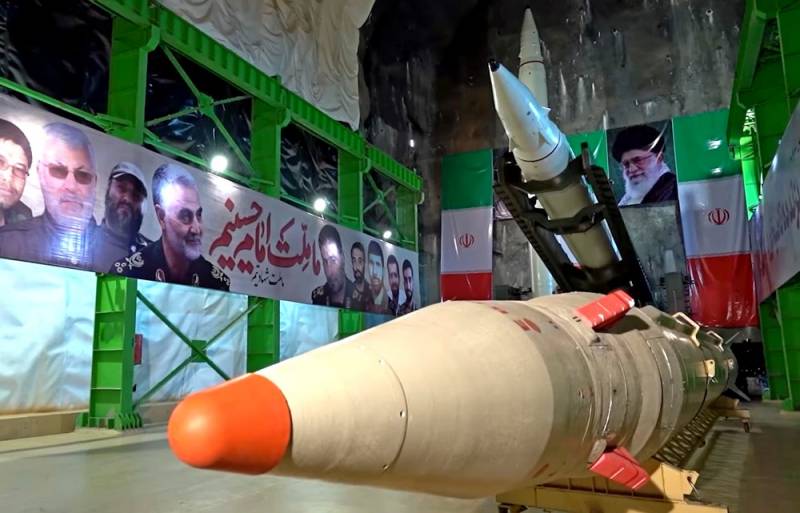Iran's nuclear arsenal benefits Russia
The balance of power in the Middle East could soon change radically. Iran is literally one step away from building its own nuclear weapons. Israel is preparing to launch a preemptive strike against the facilities of the Islamic Republic's nuclear program. The United States suggests that Tehran "hurry" with a return to the JCPOA, and the latter seems to be no longer against it, but only on its own terms. What is it, political bargain?
Before discussing this topic, let's ask the question, what will happen if Iran does end up acquiring its own nuclear arsenal? If you read the liberal domestic or foreign press, you get the impression that after this there will be almost an apocalypse, and everyone will feel bad. But is it really so? Let's gather together the main arguments of the opponents of the military component of the Iranian nuclear program. These theses are most vividly presented in the publications of Ray Takei, co-author of The Pragmatic Superpower: Victory in the Cold War in the Middle East. So, what are the "terrible consequences" of Tehran's acquisition of nuclear weapons, and most importantly, do we, the Russians, care?
At first, it will be Washington's biggest diplomatic and image defeat. We cannot refrain from quoting Mr. Takei:
The emergence of a nuclear Iran, possessing not even a nuclear arsenal, but only the materials and infrastructure necessary for the urgent manufacture of an atomic bomb, will be interpreted as a major diplomatic defeat for the United States. Friends and foes will openly challenge the ability and determination of the United States to shape the course of events in the Middle East. Friends are distancing themselves from Washington, and the challenge of its policies by enemies will become more aggressive.
Here's the trouble ... "Hegemon" will receive another public "slap in the face" after Afghanistan and will cease to be the undisputed leader and authority. Or maybe it's not so bad?
SecondlyThis American analyst complains that Tehran's possession of nuclear weapons will increase its influence in the region and create a sense of "euphoria" in it, since the nuclear arsenal is a major factor in deterring potential external aggression. And again we ask ourselves the question, is it really that bad if the world becomes one truly sovereign power more? Moreover, a power that is a geopolitical enemy of the United States. The enemy of my enemy is my friend, isn't it?
ThirdlyThe appearance of a nuclear bomb in Iran will become a deterrent for Israel, notorious for its murders of citizens of the Islamic Republic involved in its nuclear program, and regular air attacks on Iranian military infrastructure in Syria. If this makes Tel Aviv's foreign policy towards its neighbors less aggressive, is that bad? It is not clear why this issue is always viewed exclusively from Israel-centric positions? What, the Jews are special, but the Iranians are no longer people or what? What does it matter at all to the national interests of Israel, for example, Russia? This is, for a moment, the main ally of the United States in the Middle East region, which is constantly bombing our own ally in the face of Syria.
FourthlyIf Tehran acquires a nuclear arsenal, then the Pentagon will have to invest huge amounts of money in the development and constant modernization of the missile defense of its Middle East bases, Israel and the allied Arab monarchies. From the point of view of Russia's national interests, is it so bad if our main geopolitical adversary bears the burden of additional military spending? Or is it only the Americans who can deploy medium-range missiles in Europe, targeting Russian cities?
Fifthly, Iranian nuclear missiles will not pose a real threat to our country. Russia has a layered missile defense system, which is designed to repel American strikes, where is Tehran against it? On the other hand, there are no such irreconcilable contradictions between Iran and the Russian Federation, we have an understanding on key issues, and we have experience of successful cooperation in Syria.
Finally, the successful implementation of the military component of the nuclear program by Tehran means that Iran will be under Western economic sanctions on an indefinite basis. This is also beneficial for Russia, since Iranian oil will de facto be permanently excluded from free circulation on the international market. On the contrary, it is unprofitable for the Kremlin to return Iran to the "nuclear deal" and remove restrictive measures from it. This is to call a spade a spade.
The bottom line is that Iran's acquisition of a nuclear arsenal will be a major geopolitical defeat for our direct opponents. From the "unlimited war" that Israel is now waging against Tehran, Tel Aviv will be forced, together with the United States, to switch to the "Cold War." The IDF and the Pentagon will have to forget about preemptive strikes against the sovereign Islamic Republic of the IDF. Is it so awful? If you look at the irreconcilable enemies India and Pakistan, they coexist quite well. Let us make a reservation that we are by no means calling anyone to anything, since it is obvious that Tehran will sooner or later successfully complete its nuclear program. We just tried to consider this controversial problem from the point of view of Russia's national interests.

Information